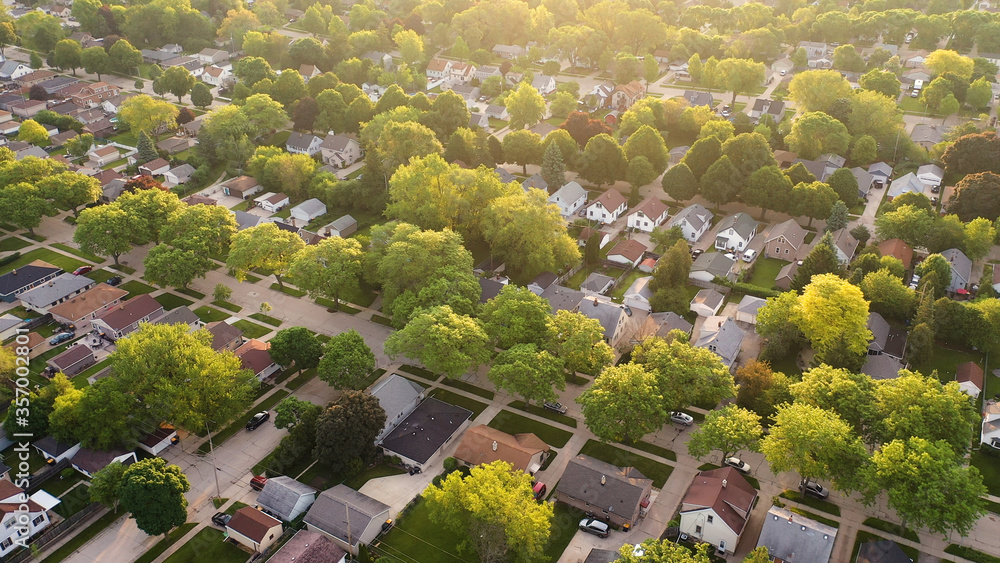
Additional Dwelling Unit Grant Program
Offering homeowners the ability to design and build new ADU units, convert finished spaces, or repair existing units to comply with Chicago city codes.
Currently, we are no longer accepting applications for the Additional Dwelling Unit Grant Program. However, our Better Basements Manual is a great guide to add a safe, sound, and legal basement unit.
Program Overview
In December 2020, the Chicago City Council passed an ordinance allowing for the creation of Additional Dwelling Units (ADUs). The ordinance aimed to create not only more affordable housing, but also create more housing types in a variety of neighborhoods for residents of all income levels. ADUs can serve as a source of financial stability or relief, encouraging revenue generation and wealth building for homeowners, especially for those who deal with high housing costs.
The ADU Grant Program pilot provides grants for income eligible residents to work with architects, general contractors and other construction services specialists to EITHER bring existing ADU units up to code OR create new, rentable spaces from their attics, basements, or garages. There are two types of grants available – planning grants and construction grants. Planning grants (maximum $10,000) cover a home consultation, architect fees, and permit fees in order to file your architectural plans with the City of Chicago Department of Buildings. Once you have submitted your plans to the City for a building permit or you are ready – permit in hand — to build out your space, construction grants (5-year forgivable loans up to $75,000) will help subsidize the construction management and construction costs of your unit.
Please note: You may only apply for EITHER a planning grant OR a construction grant. If you apply for and receive a planning grant, you may then apply for a construction grant, provided there is funding available, ONLY AFTER you have submitted your architectural plans to the City to obtain a building permit. You may not apply for both grants at the same time.
ADU Planning Eligibility Requirements
The ADU Planning Grant
The ADU planning grant subsidizes working with an architect or structural engineer to draw up design plans for your ADU. The maximum planning grant is $10,000.
| Planning Grant Requirements | ||
|---|---|---|
| Homeowner |
|
|
| Building |
|
|
| Adding a New Coach House |
|
|
| Grant Amount |
|
|
| Education Requirement |
|
|
| Working with An Architect or Structural Engineer |
|
|
ADU Construction Eligibility Requirements
The ADU Construction Grant
The ADU construction grant subsidizes the construction of your ADU unit. Your project must be completed within one year. The maximum construction grant is $75,000 and works as a five-year forgivable loan meaning 20% of the value of your loan will be forgiven each year for 5 years.
| Construction Grant Requirements | ||
|---|---|---|
| Homeowner |
|
|
| Building |
|
|
| Adding a New Coach House |
|
|
| Working with Existing ADU Spaces |
|
|
| Grant Amount |
|
|
| Education Requirement |
|
|
| Working with General Contractors |
|
|
| Project Completion |
|
|
Income Eligibility
| Number Of People In Your Household |
Maximum Allowable Income (140% AMI) |
|---|---|
| 1 Person | $91,420 |
| 2 Person | $104,440 |
| 3 Person | $117,460 |
| 4 Person | $130,480 |
| 5 Person | $140,980 |
| 6 Person | $151,480 |
| 7 Person | $161,840 |
| 8 Person | $172,340 |
Eligible Areas
Homeowners in five ADU pilot areas can apply to create one ADU on their property:
- North Zone, covering portions of the Edgewater, Lake View, Lincoln Square, North Center, Uptown and West Ridge community areas
- Northwest Zone, covering portions of the Albany Park, Avondale, East Garfield Park, Hermosa, Irving Park, Logan Square, Near West Side and West Town community areas
- West Zone, covering portions of the East Garfield Park, North Lawndale, South Lawndale and West Garfield Park community areas
- South Zone, covering portions of the Ashburn, Auburn Gresham, Chatham, Chicago Lawn, Englewood, Greater Grand Crossing, Roseland, Washington Heights, Washington Park, West Englewood, West Lawn, and Woodlawn community areas
- Southeast Zone, covering portions of the East Side, Hegewisch, South Chicago and South Deering community areas
- In addition to the geographic requirement, properties must also:
- Be at least 20 years old if adding a conversion unit in basement or attic space
- Be located in a residential zoning district — either an RM, an RS or an RT — with the exception of RS-1, single family housing (min. 6,250 SF lot area) (RM – residential multi-unit, RS – residential single, RT – residential two-flat, townhome and low-density multi-unit buildings)
Please CLICK HERE to use the City of Chicago’s Zoning and Land Use Map to see if your property is within one of the 5 pilot ADU areas and is in a residential zoning district.
Documents Needed
Please provide copies of the following documents by uploading them to your secure online NHS account after you complete the online application form or by attaching them to your printed and completed PDF application and dropping it off at an NHS office.
REQUIRED DOCUMENTS (From Homeowner)
- Proof of Ownership
- Recorded Deed and/or Copy of Your Most Recent Mortgage Statement
- Proof of Homeowners Residency (ALL persons 18 and older)
- Driver’s License or
- State of Illinois ID Card
- Proof of Homeowners’ or Property Taxes and Insurance in Effect
- Homeowners’ CURRENT Insurance Declaration Page
- Homeowners’ CURRENT Tax Bill
- Lease(s) for Rentals Units – if 2 or more units within the property
- Lease or three most Rental Receipts for each unit
APPLICANT/HOMEOWNER Income Documents For ALL Members Of The Household
(ALL Persons 18 And Older)
- 2020 Federal Income Tax Return and ALL schedules INCLUDING W-2 Statement AND 3 recent pay stubs (showing year-to-date earnings)
IF APPLICABLE:
- 2020/2021 Social Security Monthly Award Letter
- IRS 1099 Form for Social Security or Pension Benefits (2020/2021 Monthly Statement)
- Profit/Loss Statement, if Self Employed
- Public Assistance Award Letter
- Zero Income Affidavit
- Copy of Unemployment Statement
- Other
Uploading Documents
If you’ve already started the application process and still need to upload required documents, sign on to your secure NHS account by clicking HERE or going to the the “Client Login” button on the NHS webpage. You may upload and save documents and login again at a later time to upload additional documents. You may also access the “How to upload document to your online NHS account” resource by clicking HERE.
Have Questions?
Please email our Construction Services team at ADURepairs@nhschicago.org or call NHS Client Services at 773-329-4111.
Frequently Asked Questions
What are additional dwelling units (ADUs)?
An ADU is any small dwelling unit —with its own bathroom and kitchen — that is built upon the same site as a primary residential building. These units are usually rented out to tenants. You may have also heard them referred to as mother-in-law apartments, in-law suites, guest houses, or granny flats. These spaces include units in attics, basements, rear additions, and backyard buildings (coach houses). These units are intended to host a single household.
ADUs can be constructed on properties that have existing, legal residential units. The Chicago ordinance makes a distinction between coach houses, which are new units created in detached buildings in the backyard, and conversion units, which are new units constructed in an existing principal residential building that is at least 20 years old, typically in attic or basement spaces.
Please refer to our manual for Building Better Basements at: http://basementunits.nhschicago.org/
Why did the City of Chicago approve the building of additional dwelling units (ADUs)?
The ADU ordinance passed by the Chicago city council in December 2020 reversed a 1957 zoning ordinance which prohibited the construction of secondary residential units (ADUs) on Chicago lots. The ordinance now allows for the creation of new ADU units for homeowners needing extra income or those who wish to create separate spaces for multi-generational families. The ordinance and grant program also provides a path for legalization of units that were previously built without zoning approval and building permits.
Why would I create an ADU?
As a homeowner, there are space and financial reasons to consider converting a space in your home such as creating more space for multi-generational families, earning rental income to lower your overall housing costs, generating incremental income, adding overall value and equity to your home, taking care of key deferred health and safety repairs, and avoiding future fines/costs for existing non-compliant units. Consider carefully both the benefits and drawbacks of adding an ADU to your home. If you decide to move forward with your ADU project, the City of Chicago and NHS are here with the resources to assist you in making your project into a small home.
How many ADUs can I create on my property?
This ADU Repair Grant program only allows for ONE ADU to be built on your residential property.
Do I need to create extra parking for my ADU tenant?
No additional parking is required for newly created ADUs.
Can I use my ADU unit as a vacation rental?
ADUs are not to be used as short-term leases or vacation rentals, such as Airbnb.
How will my property taxes be affected by adding an ADU to my home?
Your property tax assessment may be affected. Please reach out to Cook County Treasurer’s Office to discuss the effect an ADU may have on your property tax bill and to also make sure you have taken advantage of all the money-saving exemptions to which you may be entitled.
To review your current property tax overview go to: https://www.cookcountytreasurer.com/setsearchparameters.aspx where you can search by either your property index number (PIN) or by your property tax address.
Contact Information:
Cook County Treasurer’s Office
118 North Clark Street, Room 112
Chicago, Illinois 60602
(312) 443-5100
What is the difference between a planning grant and a construction grant?
The ADU planning grant subsidizes working with an architect or structural engineer to draw up design plans for your ADU. The maximum planning grant is $10,000. This grant does not have to be repaid if you sell your house at any point in time. Your plans must be filed by your architect or structural engineer for permit within one year after you are approved for a planning grant. You must have a recorded notice with Cook County Recorder of Deeds to obtain building permit and to move forward to the construction phase.
The ADU construction grant subsidizes the building of your ADU unit. The maximum construction grant is $75,000 and works as a five-year forgivable loan meaning 20% of the value of your loan will be forgiven each year over five years. If you already have a permit from the City of Chicago Department of Buildings, then you may apply for a construction grant. If approved, your project must be completed within one year.
What is the difference between an architect and a structural engineer?
Architects and structural engineers both design building projects. Architects more focus on the visual appearance of your space as well as ensuring that their designs are compliant with various codes and laws. Structural engineers more focus on strength, durability and construction materials when designing a building. You may work with either, as long as they have an active IL license, to design your ADU project.
Basement Unit Manual
Better understand the planning costts, and risks associated with building out your basement into a rentable unit.

Don't qualify for the ADU Repair grants?
Apply for a building permit directly with the City of Chicago
NHS Construction Services
Contact NHS Construction Services if you would like NHS to consult on your ADU project (fees apply)




